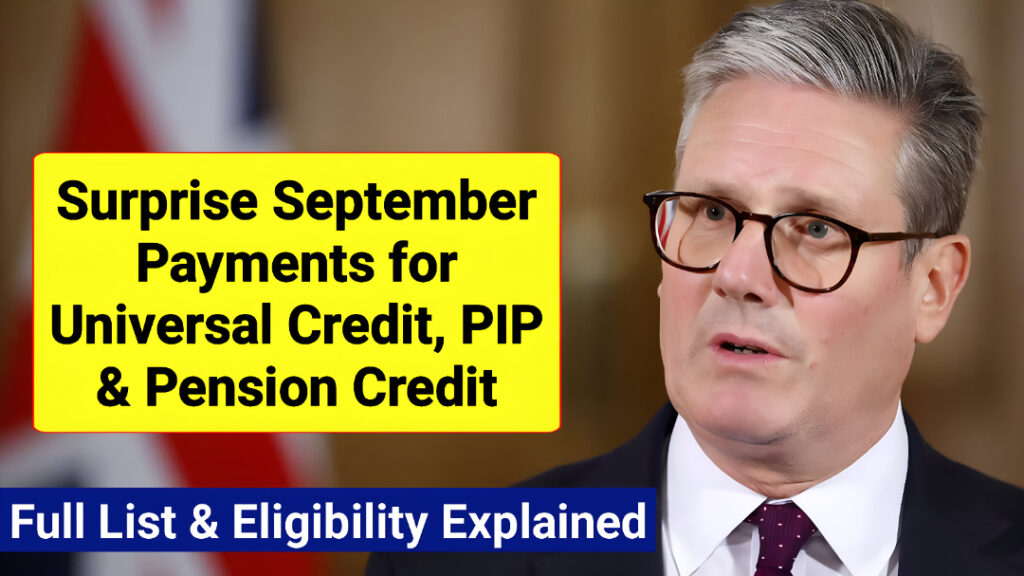Millions of UK households are set to benefit from surprise September payments through Universal Credit, PIP (Personal Independence Payment), and Pension Credit. These payments are designed to help people cope with the ongoing cost-of-living crisis, ensuring vulnerable groups receive additional financial support at a time when prices of food, energy, and housing are continuously rising. For many families, this announcement is nothing less than a financial lifeline.
What Are the September Payments?
The September payments are extra financial boosts provided by the UK Government for those receiving certain benefits such as Universal Credit, PIP, and Pension Credit. These additional funds are meant to cover rising expenses, including groceries, household bills, rent, and healthcare costs. By offering this support, the Government aims to ease the burden on households struggling with inflation and ensure that the most vulnerable citizens do not fall behind on their daily needs.
Who Will Get the Extra Universal Credit Payments?
Universal Credit claimants may receive additional September payments if they meet eligibility criteria such as low income, unemployment, or part-time work with limited earnings. This support is specifically targeted toward families and individuals struggling to keep up with the cost of living. For example, single parents, large families, and low-wage workers who rely heavily on Universal Credit will see these payments as a vital helping hand during one of the most expensive times of the year.
PIP Claimants and Their Eligibility
Those receiving Personal Independence Payment (PIP) are also included in the September payment scheme. PIP is designed for people with long-term illnesses or disabilities, and the extra payment helps cover additional care, medical costs, or mobility needs. If you already receive PIP, the payment is expected to be credited automatically without the need for a separate application, saving recipients the stress of additional paperwork.
Pension Credit Claimants and Payments
Pension Credit recipients, particularly those with lower retirement income, are set to benefit from this scheme as well. The surprise September payment will provide extra financial support, helping pensioners afford food, heating, and other basic needs. This comes as especially good news for elderly citizens living on fixed pensions, who often struggle with rising energy and grocery bills that consume a large part of their limited income.
How Much Will the September Payments Be?
The exact payment amounts may vary depending on your benefit type and personal circumstances. While some households may receive a smaller amount, others could qualify for a larger financial boost. On average, these payments are designed to provide meaningful relief, allowing recipients to manage basic living costs like rent, heating, and food with more ease during September when expenses often rise before the winter season.
When Will the Payments Arrive?
The September payments will start rolling out in the middle of the month, with most beneficiaries expected to receive the money directly into their bank accounts before the end of September. Claimants are advised to regularly check their benefit statements and online DWP (Department for Work and Pensions) accounts for updates, as payment dates can vary slightly depending on individual circumstances or processing times.
How to Apply for the September Payments
For most recipients, there is no need to apply separately for these surprise payments. If you are already receiving Universal Credit, PIP, or Pension Credit, the payment should arrive automatically in your account. However, those who recently applied for benefits should ensure their claims are fully processed and approved before the qualifying date to make sure they do not miss out on this financial help.
Why the Government Is Giving Extra Payments
The UK Government has introduced these payments in response to the ongoing financial struggles faced by millions of households. Inflation, high utility bills, and rising food prices have placed immense pressure on people, especially those on low incomes. By providing surprise September payments, the Government hopes to reduce hardship, prevent vulnerable groups from falling into debt, and offer immediate relief during one of the most challenging periods of the year.
Common Issues and Delays
Some households may experience delays in receiving their September payments due to processing backlogs, verification checks, or banking issues. In such cases, claimants are advised to contact the DWP helpline or check their Universal Credit, PIP, or Pension Credit accounts online for updates. While most payments are expected on time, it is always best to keep track of your benefit account to avoid unnecessary confusion.
Why These Payments Matter
For millions of people, these extra payments are more than just financial aid—they are a lifeline in difficult times. Whether it’s covering heating bills, buying essential groceries, or helping pensioners live with dignity, the surprise September payments are designed to make a meaningful difference in people’s everyday lives. For families with children, disabled individuals, and older pensioners, the reassurance of extra support can reduce stress and help maintain stability.
Conclusion
The September payments for Universal Credit, PIP, and Pension Credit come as welcome news for millions across the UK. With rising costs affecting households nationwide, this financial support is expected to ease immediate pressures and provide short-term stability. While long-term solutions are still needed to tackle inflation and living costs, these payments represent a crucial step in helping vulnerable groups weather the ongoing cost-of-living crisis.
